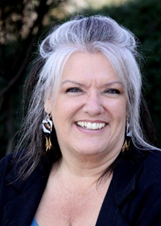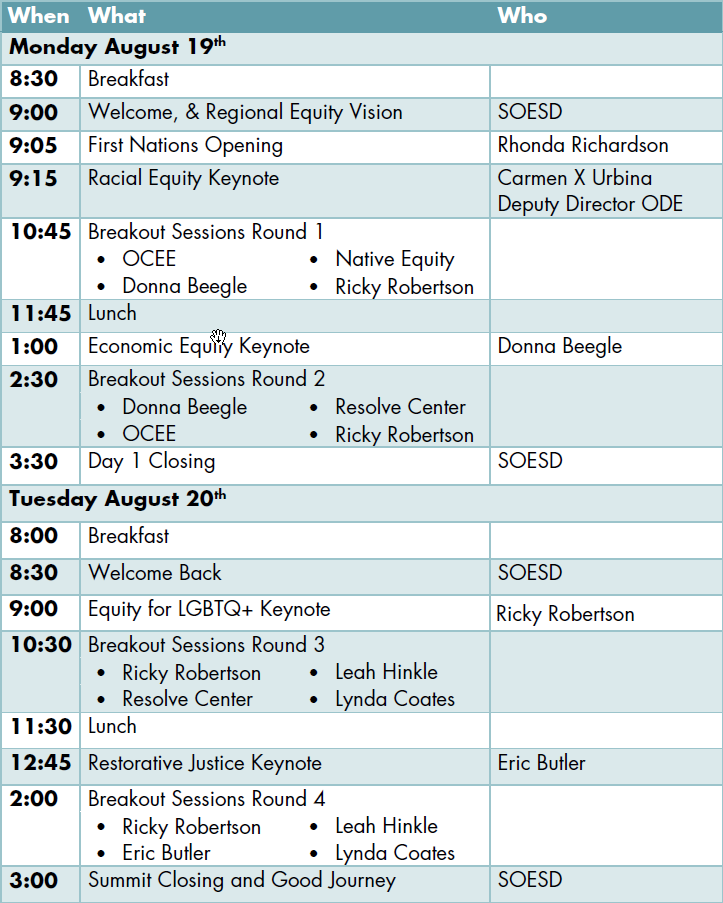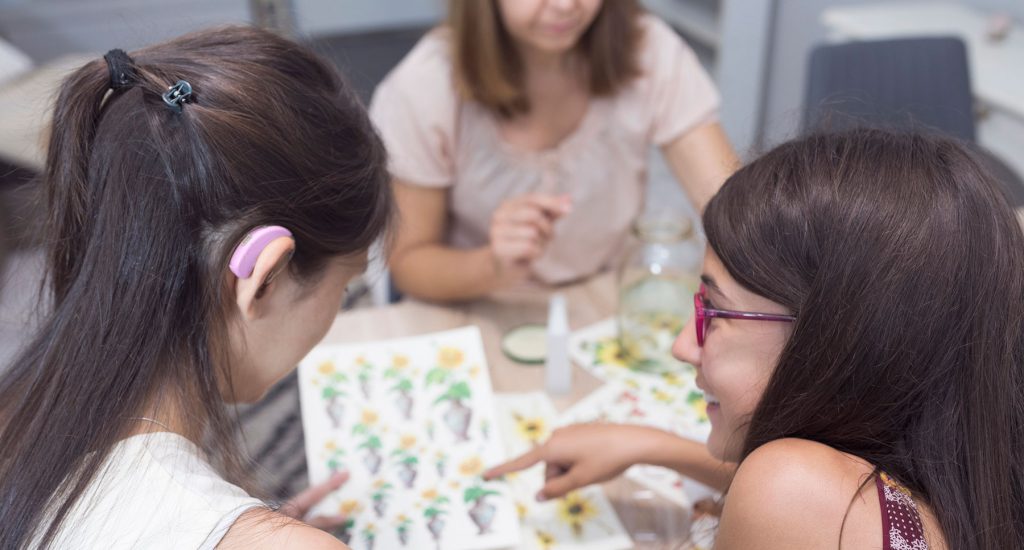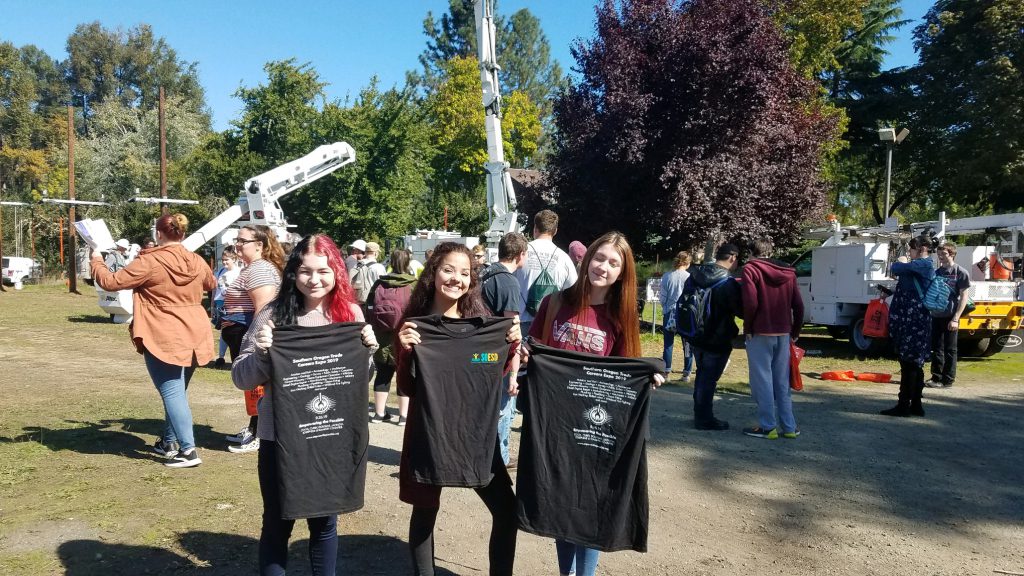
On Sept. 26, 2019 nearly 2000 students gathered at Seven Feather’s Convention Center in Canyonville for the Southern Oregon Careers Trade Expo. This event, for which SOESD is the fiscal agent, is organized to introduce high school juniors and seniors, veterans, currently serving Military Personnel, and referred public and private agencies to exciting opportunities in many arenas. Some of these include aviation and rail, archaeology, construction trades, wildlandfire fighting, mechanics and more.
“I had no idea what sparked my interest, but being here made me realize that there are a lot more options than what it seems out there,” said Mary Burnett, a 12th grader.
SOESD attended the event to hand out t-shirts to students (pictured) and witness the activities in action.
For more information visit http://www.empowerthepossible.org/

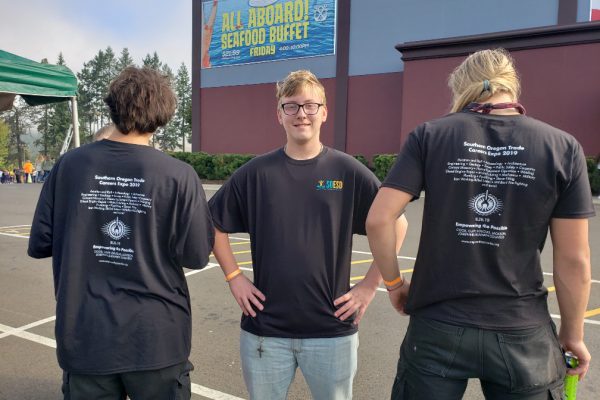
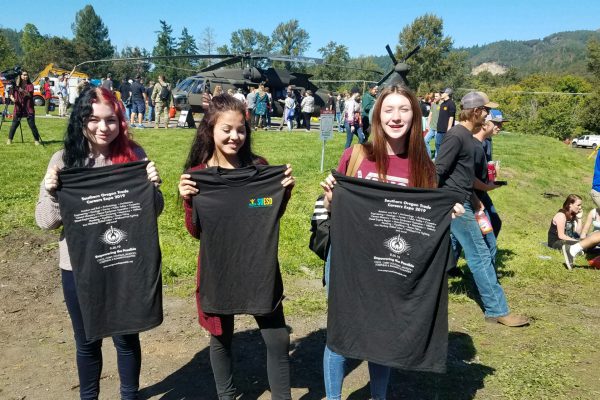
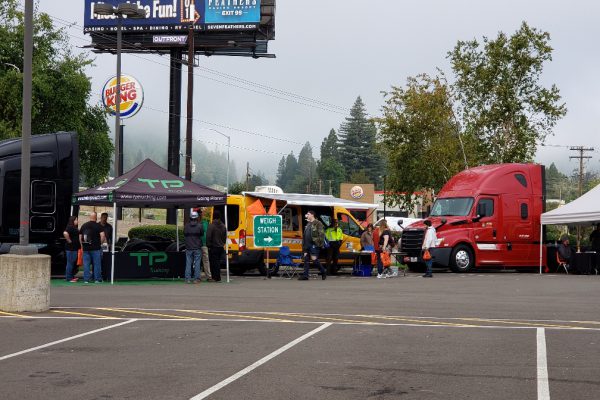
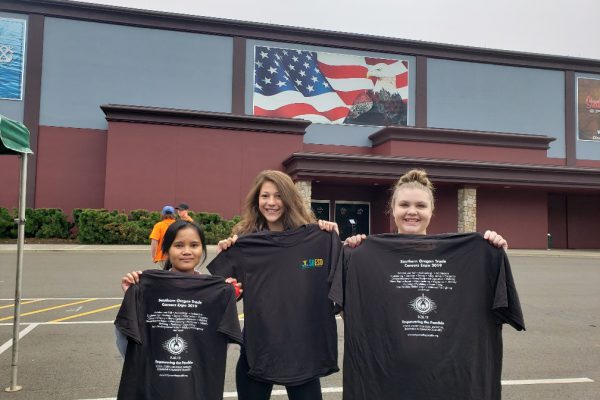
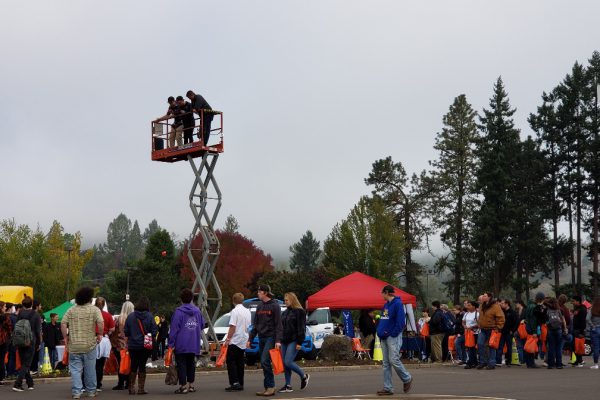
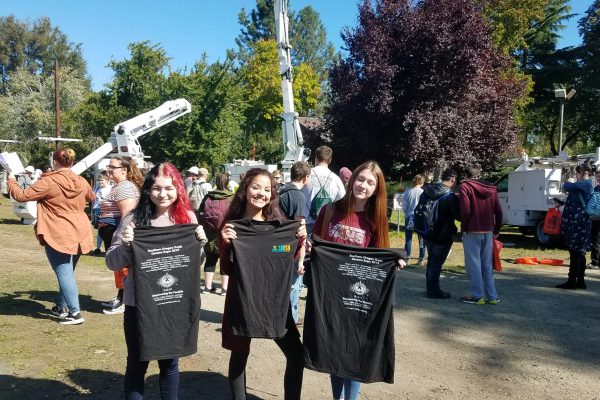
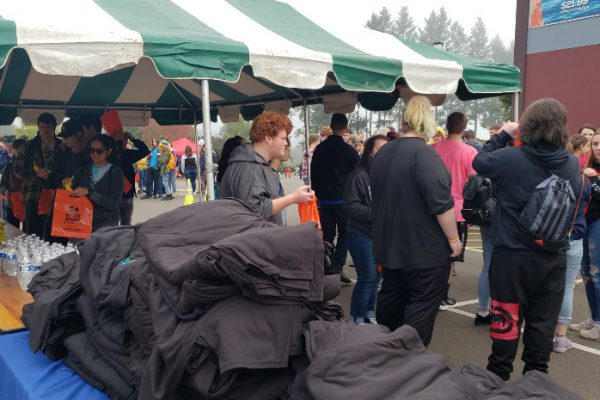
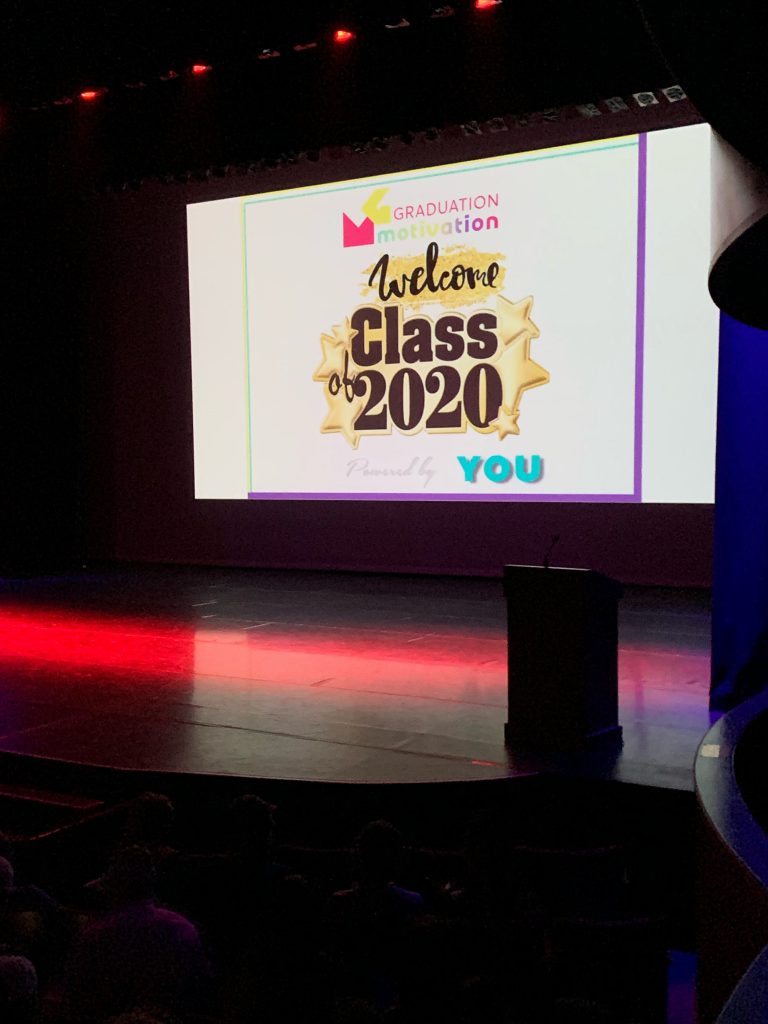
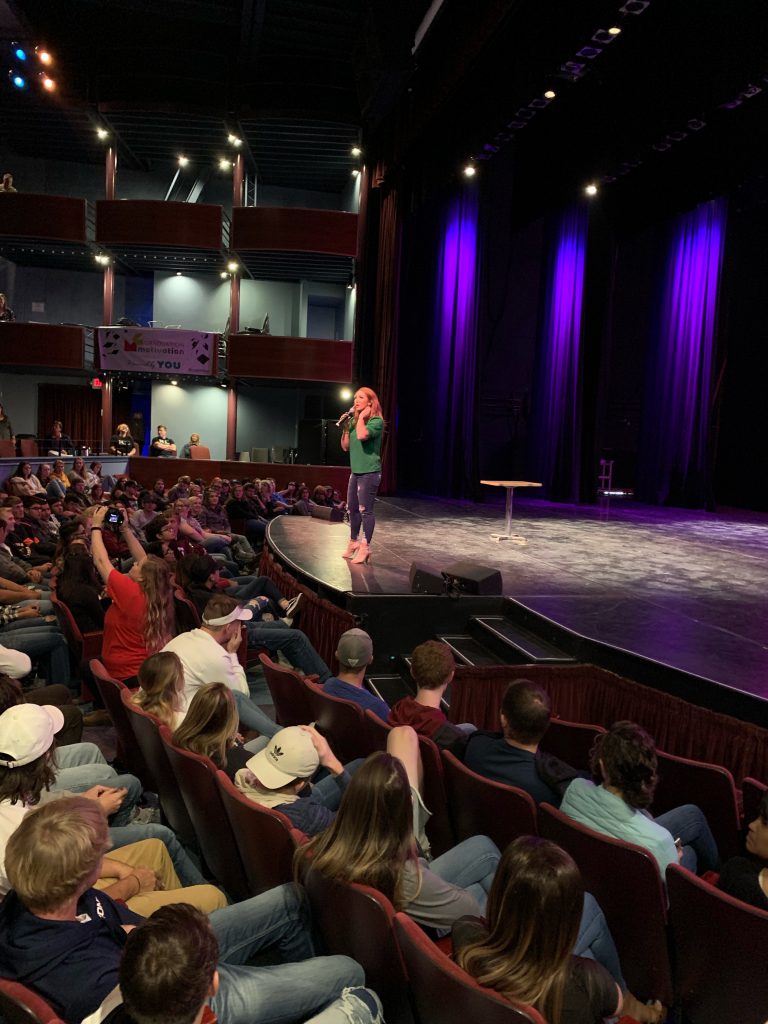 About 700 seniors gathered this September for an annual event organized by Klamath Promise and the Herald & News. Students learned about the many opportunities open to them post-graduation. Singer, motivational speaker and author Jessie Funk spoke, sang and joked with the students from all over Klamath County. Funk told personal stories to motivate students to rise above the challenges they face in school and beyond. The event, designed to encourage high school seniors to “finish strong”, is an annual crowd pleaser and a great way to kick off the school year for the class of 2020.
About 700 seniors gathered this September for an annual event organized by Klamath Promise and the Herald & News. Students learned about the many opportunities open to them post-graduation. Singer, motivational speaker and author Jessie Funk spoke, sang and joked with the students from all over Klamath County. Funk told personal stories to motivate students to rise above the challenges they face in school and beyond. The event, designed to encourage high school seniors to “finish strong”, is an annual crowd pleaser and a great way to kick off the school year for the class of 2020.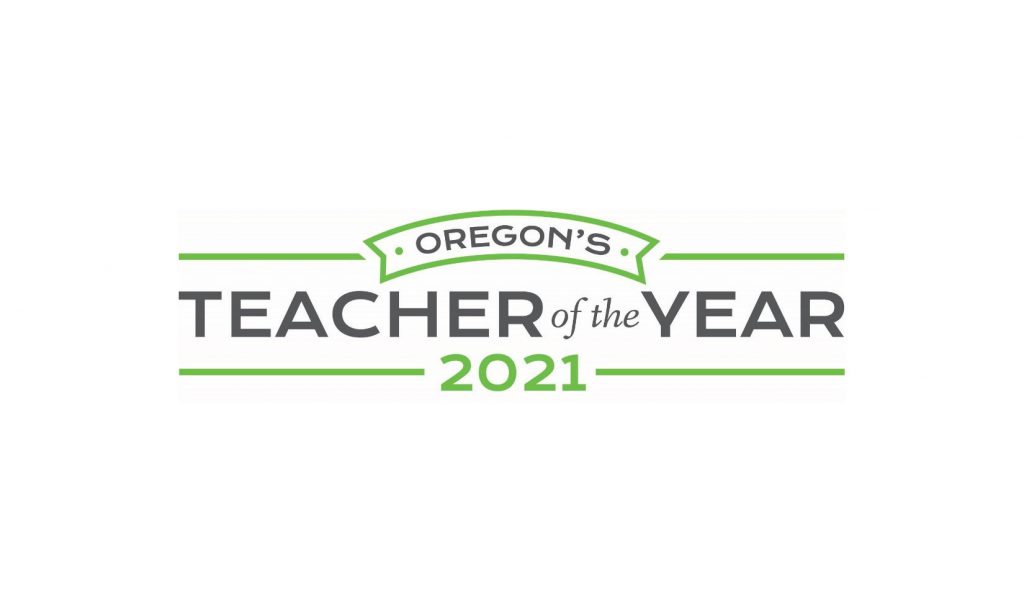
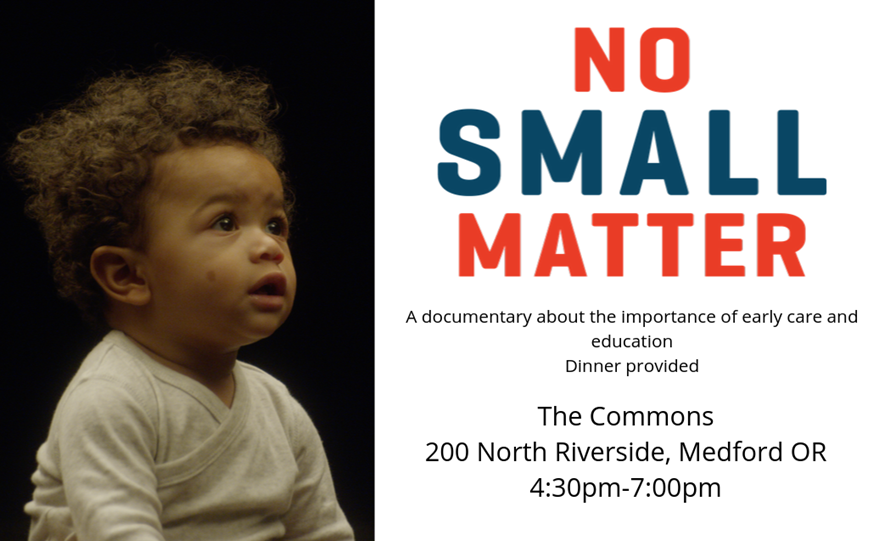
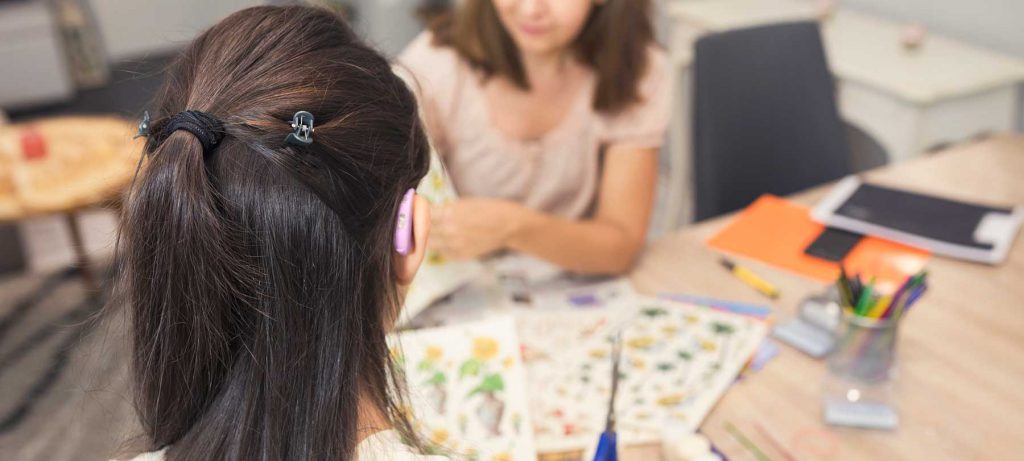

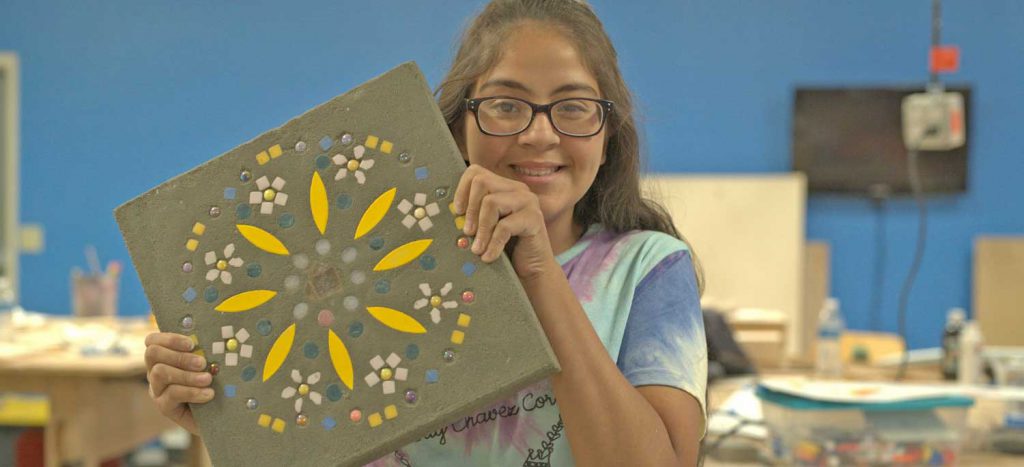
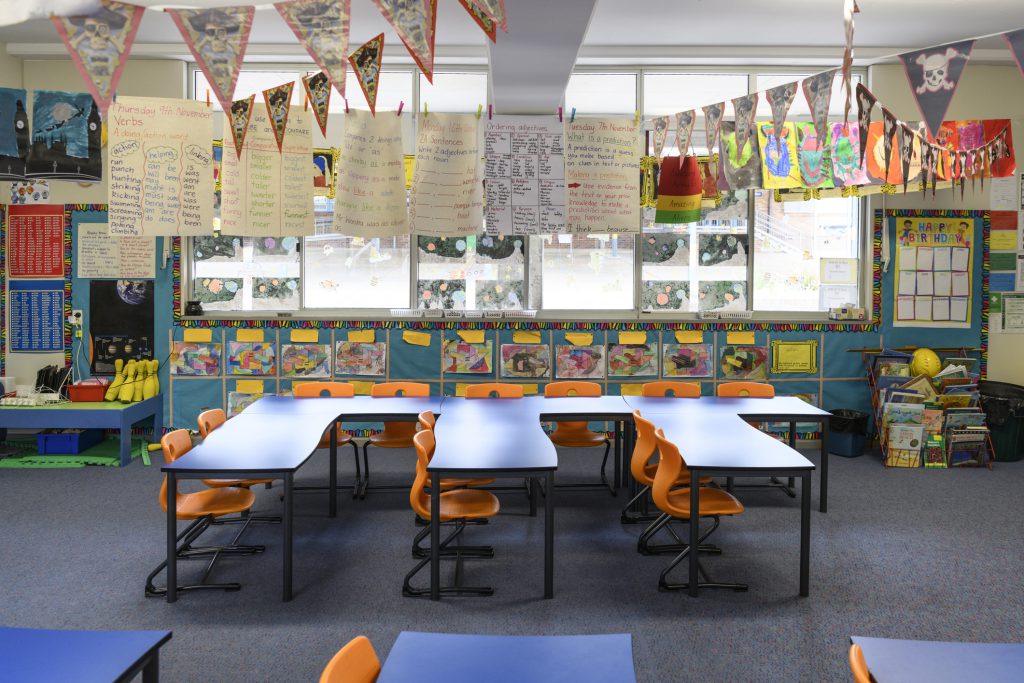

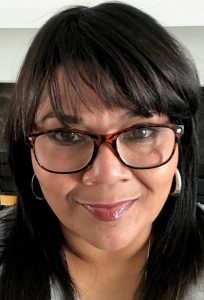 Carmen X Urbina is a proven leader who brings the diverse, lived-experience and unique skills we need in Oregon today. She has developed her exceptional talents serving in early learning settings, K-12 school districts and ESDs, higher education, and leading culturally specific and highly respected community-based organizations in Oregon. Carmen’s efforts are always grounded in equity, focused on the needs of all our students and families, and designed to bring community and education organizations together in both safe and effective ways.
Carmen X Urbina is a proven leader who brings the diverse, lived-experience and unique skills we need in Oregon today. She has developed her exceptional talents serving in early learning settings, K-12 school districts and ESDs, higher education, and leading culturally specific and highly respected community-based organizations in Oregon. Carmen’s efforts are always grounded in equity, focused on the needs of all our students and families, and designed to bring community and education organizations together in both safe and effective ways. Dr. Donna Beegle: Born into a migrant labor family and married at 15, earned her GED at age 26, within 10 years she then received her doctorate in Educational Leadership. She is an authentic voice from poverty that speaks, writes and trains across the nation to break the iron cage of poverty for others through Communication Across Barriers (CAB). For more than 25 years, she has traveled throughout hundreds of cities in 47 states and four countries to assist professionals with proven strategies for breaking poverty barriers. State agencies, politicians and other organizations have partnered with her to implement community-wide approaches to improving outcomes for citizens in poverty.
Dr. Donna Beegle: Born into a migrant labor family and married at 15, earned her GED at age 26, within 10 years she then received her doctorate in Educational Leadership. She is an authentic voice from poverty that speaks, writes and trains across the nation to break the iron cage of poverty for others through Communication Across Barriers (CAB). For more than 25 years, she has traveled throughout hundreds of cities in 47 states and four countries to assist professionals with proven strategies for breaking poverty barriers. State agencies, politicians and other organizations have partnered with her to implement community-wide approaches to improving outcomes for citizens in poverty. Ricky Robertson
Ricky Robertson Eric Butler is a Restorative Justice Educator and Activist. A Hurricane Katrina survivor, he relocated to Oakland, California where he rebuilt a new life, successfully facilitating Grief Circles in response to homicide and extreme violence in area schools as part of Catholic Charities’ crisis response program. He also worked as a lead mediator with Youth Uprising, where he mediated conflicts on the ground in Oakland neighborhoods and schools.
Eric Butler is a Restorative Justice Educator and Activist. A Hurricane Katrina survivor, he relocated to Oakland, California where he rebuilt a new life, successfully facilitating Grief Circles in response to homicide and extreme violence in area schools as part of Catholic Charities’ crisis response program. He also worked as a lead mediator with Youth Uprising, where he mediated conflicts on the ground in Oakland neighborhoods and schools. Leah Hinkle has been an education consultant to ten school districts with the Teaching and Learning Department at Clackamas Education Service District for the last four years. Her specialty is English learner instruction and services funded through Title III. She formerly worked in the Greater Albany School District for ten years, first as a bilingual educational assistant, then an ELD teacher at the middle and high school levels, and lastly as the district’s Teacher on Special Assignment to English Learner Programs.
Leah Hinkle has been an education consultant to ten school districts with the Teaching and Learning Department at Clackamas Education Service District for the last four years. Her specialty is English learner instruction and services funded through Title III. She formerly worked in the Greater Albany School District for ten years, first as a bilingual educational assistant, then an ELD teacher at the middle and high school levels, and lastly as the district’s Teacher on Special Assignment to English Learner Programs.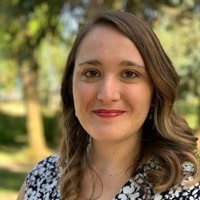 Raphaelle (Raphi) Miller, Director of Education & School Services joined the staff of Resolve in 2013, having previously served as a volunteer and intern since 2011. In her work as a restorative justice practitioner, trainer, coach and consultant, Raphi supports schools in system-wide implementation of restorative justice practices. Raphi works collaboratively to advance restorative justice in education through participation in regional collective impact initiatives and as a planning committee member for the Northwest Justice Forum. Raphi is currently pursuing a Master’s in Public Administration from University of North Carolina Chapel Hill. She graduated magna cum laude from Southern Oregon University with her B.A. in Human Communication, certificates in Conflict Resolution and the Management of Human Resources, and a minor in Business Administration.
Raphaelle (Raphi) Miller, Director of Education & School Services joined the staff of Resolve in 2013, having previously served as a volunteer and intern since 2011. In her work as a restorative justice practitioner, trainer, coach and consultant, Raphi supports schools in system-wide implementation of restorative justice practices. Raphi works collaboratively to advance restorative justice in education through participation in regional collective impact initiatives and as a planning committee member for the Northwest Justice Forum. Raphi is currently pursuing a Master’s in Public Administration from University of North Carolina Chapel Hill. She graduated magna cum laude from Southern Oregon University with her B.A. in Human Communication, certificates in Conflict Resolution and the Management of Human Resources, and a minor in Business Administration.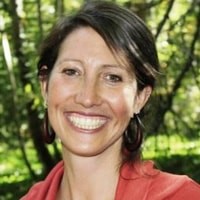 Cara Walsh, As the Director of Restorative Justice, Cara has been working to support the development, implementation, and delivery of restorative justice services since 2010. In addition to providing training, consultation, and coaching on a local level, Cara works for the advancement of restorative justice throughout the region via her leadership with the Restorative Justice Coalition of Oregon, the Northwest Justice Forum and the Transforming Justice Advisory Committee. Her professional and educational experience is grounded in her passion for creating and facilitating integrative opportunities and experiences for community engagement, empowerment and transformation. Cara earned her M.A. from Prescott College.
Cara Walsh, As the Director of Restorative Justice, Cara has been working to support the development, implementation, and delivery of restorative justice services since 2010. In addition to providing training, consultation, and coaching on a local level, Cara works for the advancement of restorative justice throughout the region via her leadership with the Restorative Justice Coalition of Oregon, the Northwest Justice Forum and the Transforming Justice Advisory Committee. Her professional and educational experience is grounded in her passion for creating and facilitating integrative opportunities and experiences for community engagement, empowerment and transformation. Cara earned her M.A. from Prescott College. as been an educator for 40 years currently working as a professor in the Concordia College Doctoral Program and as a Senior Associate for the Oregon Center for Educational Equity (OCEE). She was the 2000 Oregon Principal of the Year and as a leader focused on underserved children and families and systemic reform. She has consulted throughout the state on issues of diversity, inclusion, equity and school change. She has presented at both state and national conferences around her dissertation topic: White Leaders Examine Power and Privilege: The Challenges of Leading for Equity.
as been an educator for 40 years currently working as a professor in the Concordia College Doctoral Program and as a Senior Associate for the Oregon Center for Educational Equity (OCEE). She was the 2000 Oregon Principal of the Year and as a leader focused on underserved children and families and systemic reform. She has consulted throughout the state on issues of diversity, inclusion, equity and school change. She has presented at both state and national conferences around her dissertation topic: White Leaders Examine Power and Privilege: The Challenges of Leading for Equity. has been an educator for 20 years. He is currently a middle school social studies teacher in Eugene, Oregon, focusing on teaching history through a non-dominant lens. He guides his students to critically examine, discuss and explore, through historical analysis and current events, an array of social justice issues and actions. Jesse embraces opportunities to engage in challenging conversations around equity, diversity and inclusion with his colleagues, his students, and his own multi-racial children. He also provides professional development as a Facilitator for the Oregon Center for Educational Equity (OCEE).
has been an educator for 20 years. He is currently a middle school social studies teacher in Eugene, Oregon, focusing on teaching history through a non-dominant lens. He guides his students to critically examine, discuss and explore, through historical analysis and current events, an array of social justice issues and actions. Jesse embraces opportunities to engage in challenging conversations around equity, diversity and inclusion with his colleagues, his students, and his own multi-racial children. He also provides professional development as a Facilitator for the Oregon Center for Educational Equity (OCEE). is a member of the Ohlone Costanoan Esselen Nation whose traditional homelands are located in the now Greater Monterey Bay Area of California. She is the Youth Development Specialist for the Cow Creek Band of Umpqua Tribe of Indians, primarily supporting families with youth ages 0-15. Her work includes providing resources to families with early learners, IEP and 504 support for students and families, tutoring at the Expanding Horizons Youth Center, Tribal education benefit program management and, of course, duties as assigned.
is a member of the Ohlone Costanoan Esselen Nation whose traditional homelands are located in the now Greater Monterey Bay Area of California. She is the Youth Development Specialist for the Cow Creek Band of Umpqua Tribe of Indians, primarily supporting families with youth ages 0-15. Her work includes providing resources to families with early learners, IEP and 504 support for students and families, tutoring at the Expanding Horizons Youth Center, Tribal education benefit program management and, of course, duties as assigned.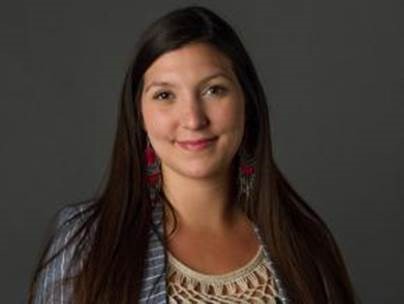 Renae Guenther is a member of the Cow Creek South Umpqua Tribe of Indians and has been on the Tribal Attendance Pilot Project (TAPP) since its beginning in 2016. TAPP is a collaborative project of all nine federally recognized tribes of Oregon with the Oregon Department of Education to address chronic absenteeism of American Indian/Alaska Native students in selected schools. Now three years into the project, TAPP is showing gains in AI/AN attendance rates.
Renae Guenther is a member of the Cow Creek South Umpqua Tribe of Indians and has been on the Tribal Attendance Pilot Project (TAPP) since its beginning in 2016. TAPP is a collaborative project of all nine federally recognized tribes of Oregon with the Oregon Department of Education to address chronic absenteeism of American Indian/Alaska Native students in selected schools. Now three years into the project, TAPP is showing gains in AI/AN attendance rates.